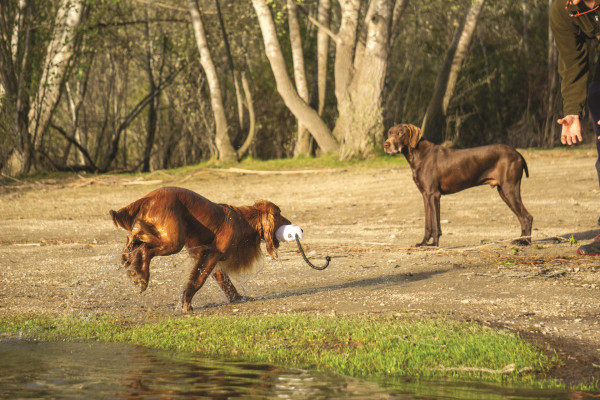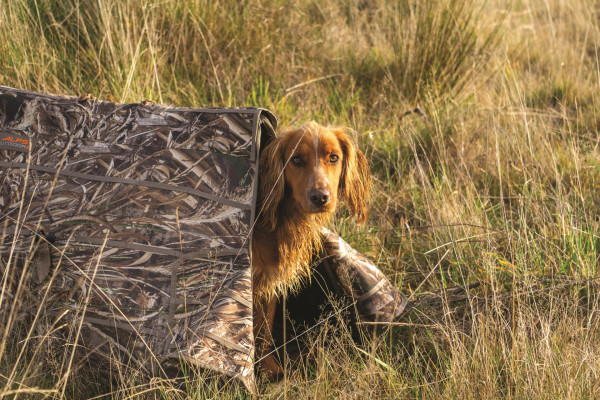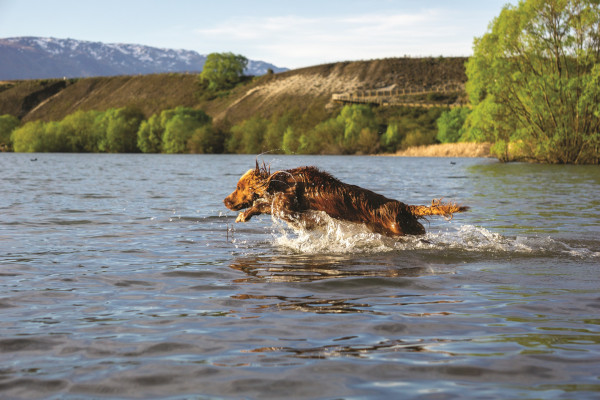Fine-tuning for the First Flight
- 19/04/2024

Written by - Scott Waterman
The game bird dog is a massive part of the whole experience of going game bird hunting. There can be a lot involved in terms of preparation at this time of the year; readying the maimai and pond areas, decoys, trapping, pest control and shooting practice. But how much time or prep do you put into the hardest working team member in your hunting party, your dog?
Your dog is the one retrieving your ducks, flushing quail or pointing the pheasant. Have you put the time in to enjoy your hunting experiences with your most loyal and diligent companion? What should we be thinking about in the month before the season opens?
Consider a few training runs from the maimai so the dog gets used to the environment that you will expect them to do the work in. Making it easy for your dog to get in and out of the maimai or boat is essential. This can help with building up the fitness for your dog. You wouldn’t jump off the couch into a marathon so we can’t ask our dogs to do effectively the same thing either.
If you have a dog that is only active in retrieving ducks for a few days a season then some retrieving in water in the final weeks leading up to opening weekend to build up strength would be a massive benefit. If you don't live close to your pond or water, then this would necessitate incorporating some land-based retrieving instead.

Appropriate conditioning is particularly crucial for upland game bird hunting, where your dog typically covers a lot more ground and terrain than you. Preparing joints, ligaments, tendons and paws by gradually building up time and distance for the work they will be doing helps prevent injuries and promotes longevity.
Being mindful of your dog's age and abilities is vital, especially during group hunting scenarios, where external pressures might tempt you to push your dog beyond its limits. Striking a balance between challenging your dog appropriately and taking into account their level of physical preparedness will make for a fun and satisfying day out for both you and your dog.
Appropriate fuelling for your dog is key, especially if they are likely to be doing more work than normal through this part of the year. Good food with energy and protein will help with recovery and fitness. If you see that they are losing condition, add more fat and protein in their diet. Talk to your vet or animal feed supplier as they will have different food for working and hunting dogs with extra ingredients. Electrolytes are another option to discuss with your vet, you can add to your dog’s water if they’re really working hard.

Let’s not forget first aid. Injuries do happen and you should be prepared for them. Most pig hunters have a dog first aid kit - it shouldn't be different for a game bird dog. The risks are there too - jumping in the water next to a hidden fence post, getting cut on a tree spike, or snagged in the undergrowth. Do you have the kit to clean and attend to the wound?
Also along the lines of dog health, it’s important to think about worming or dosing for sheep measles. Some landowners would ask you to do this before entry, but it’s always good practice if you are going on different properties and it shows respect for the land you are hunting on. Vets can give you a record card for this, the same as they do for sheep dog trials.
Now we have the foundations covered to have an enjoyable game bird season, can we fit in a few last minute training exercises to help build fitness and trust? Although training for your dog should be built up over time, some time invested just before the season can still be effective. It could be the difference between the trophy mallard being lost in the swamp and reeds, or its retrieval being one of the highlights of the weekend.
Several questions that are worth asking in advance of the season: Can my dog wait and be patient with lots of distractions? Do they run too far and don’t recall when asked? How long do they hold the point?

Basic preparation for this coming season with my 20 month old working cocker spaniel includes a lot of patience training - sitting patiently for a period of time with distractions around (people, chickens, other dogs) and sometimes having a retrieve, his reward, at the end. Increasing the time spent sitting patiently, step by step, helps improve steadiness. Once they’ve nailed that, you might go on to incorporate a bang to simulate a gunshot before sending for the retrieve.
Other ideas include sitting in your laydown blind in your garden with your dog in their blind or behind you waiting for their food. Perhaps even taking your meal or cuppa out there too - it might sound a bit silly but you want your dog to sit next to you in a paddock or maimai without moving. If your dog can't do it in your garden then they’re unlikely to do it out in the field.

The least exciting elements of training could bring you the most rewards on the day. Be honest with yourself before this game bird season about what you need to work on, then go out and work on it. Patience can be practiced anywhere.
Think about the real hunting and shooting scenarios you are going to ask of your dog, break it down and work on each thing for a few days, then move on to putting a couple of things together. This is where having the guidance of an app or mentor truly can be invaluable. There’s plenty of advice out there, especially online, the main thing is to find something that works for you and keep at it. I use the BG Gundog training app and have followed it from my spaniel pup being nine weeks old. It’s easy to follow and works for me and my lifestyle.
I can’t give you the magic answers on training your dog, but I will give you encouragement. Both of you working as a team can be the best part of game bird hunting. When your dog charges through the water to retrieve a duck, bashes their way through thick cover to find you a quail, or holds steady on a point for you to get up that hill for the flush of the bird - you wouldn't achieve these things without your hard-hunting teammate.